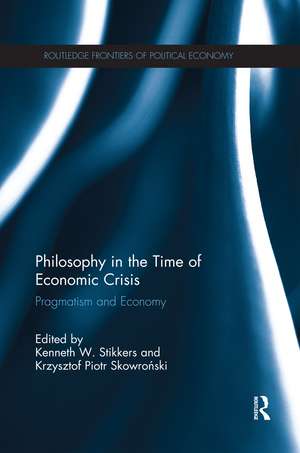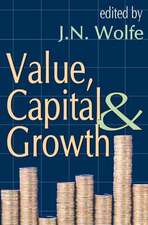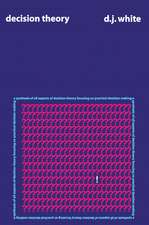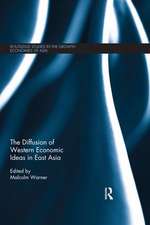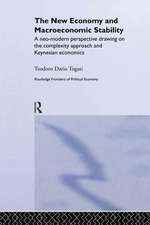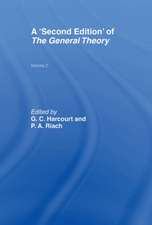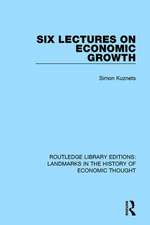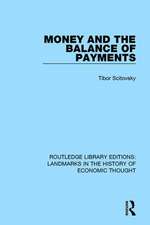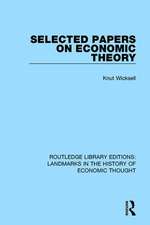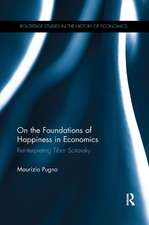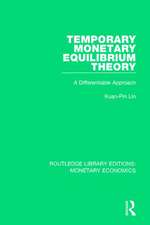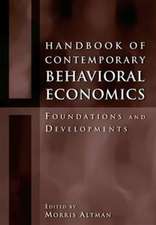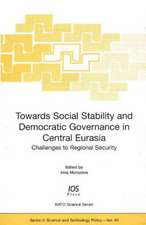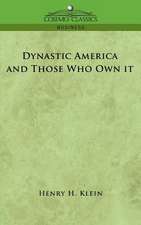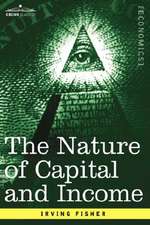Philosophy in the Time of Economic Crisis: Pragmatism and Economy: Routledge Frontiers of Political Economy
Editat de Kenneth W. Stikkers, Krzysztof Piotr Skowrońskien Limba Engleză Paperback – 14 aug 2020
American pragmatism, among the various contemporary philosophic traditions, lends itself specially to dialogue with economics because of its view of philosophy as an instrument for solving the real, concrete problems of human life, both personal and social. The essays in this volume, drawing heavily on the tradition of pragmatism, suggest that the economic crises of our time (the 2008 collapse of real estate and finance markets) might not be merely technical in nature - that is, the result of faulty applications of economic tools by politicians and policy makers, based up conventional economic models - but also due to the faulty philosophical assumptions underlying those models. These essays suggest that the overcoming of our current economic crises requires that economists once again become moral philosophers, or that philosophers once again engage themselves in economic matters. In either case, this volume aims to foster dialogue between the two disciplines and in that way, contribute to the improvement of contemporary economic life.
This book is suitable for those who study political economy, economic theory and economic philosophy.
| Toate formatele și edițiile | Preț | Express |
|---|---|---|
| Paperback (1) | 389.66 lei 6-8 săpt. | |
| Taylor & Francis – 14 aug 2020 | 389.66 lei 6-8 săpt. | |
| Hardback (1) | 763.78 lei 6-8 săpt. | |
| Taylor & Francis – 25 aug 2017 | 763.78 lei 6-8 săpt. |
Din seria Routledge Frontiers of Political Economy
-
 Preț: 326.49 lei
Preț: 326.49 lei -
 Preț: 312.86 lei
Preț: 312.86 lei -
 Preț: 310.95 lei
Preț: 310.95 lei -
 Preț: 309.79 lei
Preț: 309.79 lei - 9%
 Preț: 867.54 lei
Preț: 867.54 lei -
 Preț: 151.96 lei
Preț: 151.96 lei -
 Preț: 286.98 lei
Preț: 286.98 lei -
 Preț: 310.55 lei
Preț: 310.55 lei -
 Preț: 327.83 lei
Preț: 327.83 lei - 9%
 Preț: 1005.48 lei
Preț: 1005.48 lei -
 Preț: 325.09 lei
Preț: 325.09 lei - 9%
 Preț: 938.47 lei
Preț: 938.47 lei -
 Preț: 310.01 lei
Preț: 310.01 lei -
 Preț: 309.30 lei
Preț: 309.30 lei -
 Preț: 309.90 lei
Preț: 309.90 lei -
 Preț: 310.36 lei
Preț: 310.36 lei -
 Preț: 386.11 lei
Preț: 386.11 lei -
 Preț: 316.03 lei
Preț: 316.03 lei -
 Preț: 295.14 lei
Preț: 295.14 lei -
 Preț: 155.43 lei
Preț: 155.43 lei -
 Preț: 311.41 lei
Preț: 311.41 lei -
 Preț: 152.66 lei
Preț: 152.66 lei - 9%
 Preț: 1005.31 lei
Preț: 1005.31 lei -
 Preț: 281.72 lei
Preț: 281.72 lei -
 Preț: 278.97 lei
Preț: 278.97 lei -
 Preț: 311.61 lei
Preț: 311.61 lei -
 Preț: 356.63 lei
Preț: 356.63 lei -
 Preț: 371.95 lei
Preț: 371.95 lei -
 Preț: 310.95 lei
Preț: 310.95 lei -
 Preț: 324.87 lei
Preț: 324.87 lei -
 Preț: 328.76 lei
Preț: 328.76 lei -
 Preț: 359.03 lei
Preț: 359.03 lei -
 Preț: 329.09 lei
Preț: 329.09 lei -
 Preț: 341.32 lei
Preț: 341.32 lei - 26%
 Preț: 1047.06 lei
Preț: 1047.06 lei - 18%
 Preț: 1169.45 lei
Preț: 1169.45 lei - 18%
 Preț: 1555.17 lei
Preț: 1555.17 lei - 18%
 Preț: 1053.92 lei
Preț: 1053.92 lei - 18%
 Preț: 1059.84 lei
Preț: 1059.84 lei - 25%
 Preț: 767.47 lei
Preț: 767.47 lei - 18%
 Preț: 731.92 lei
Preț: 731.92 lei - 26%
 Preț: 822.54 lei
Preț: 822.54 lei - 18%
 Preț: 1796.21 lei
Preț: 1796.21 lei - 26%
 Preț: 1184.91 lei
Preț: 1184.91 lei - 18%
 Preț: 1120.23 lei
Preț: 1120.23 lei - 15%
 Preț: 700.95 lei
Preț: 700.95 lei - 18%
 Preț: 1116.31 lei
Preț: 1116.31 lei - 22%
 Preț: 299.52 lei
Preț: 299.52 lei
Preț: 389.66 lei
Nou
Puncte Express: 584
Preț estimativ în valută:
74.57€ • 77.38$ • 62.33£
74.57€ • 77.38$ • 62.33£
Carte tipărită la comandă
Livrare economică 17-31 martie
Preluare comenzi: 021 569.72.76
Specificații
ISBN-13: 9780367594671
ISBN-10: 0367594676
Pagini: 208
Dimensiuni: 156 x 234 x 11 mm
Greutate: 0.45 kg
Ediția:1
Editura: Taylor & Francis
Colecția Routledge
Seria Routledge Frontiers of Political Economy
Locul publicării:Oxford, United Kingdom
ISBN-10: 0367594676
Pagini: 208
Dimensiuni: 156 x 234 x 11 mm
Greutate: 0.45 kg
Ediția:1
Editura: Taylor & Francis
Colecția Routledge
Seria Routledge Frontiers of Political Economy
Locul publicării:Oxford, United Kingdom
Public țintă
Postgraduate and UndergraduateCuprins
I. The Crisis in Philosophical and Historical Perspective
1. Philosophy and the Crisis of Economic Science, by Kenneth W. Stikkers (Southern Illinois University Carbondale, USA)
2. On the Shadow and the Substance: Adam Smith, John Dewey, and the Great Recession, by Michael Schleeter (Pacific Lutheran University, USA)
3. John Dewey: A Philosophy for Times of Crisis, by Matteo Santarelli (Unversity of Molise, Italy)
II. The Narrative and Rhetoric of ‘Crisis’
4. Neopragmatist Ethnocentric Rhetoric on Economic Crisis: Richard Rorty and Social Amelioration by Redescription, by Krzysztof Piotr Skowroński (Opole University, Poland)
5. If Philosophers Are So Smart: A Metaphor of ‘Global Economic Crisis’, by Maja Niestrόj (Opole University, Poland)
III. The Economy of Happiness and Desire
6. Mead's Bio-Social Theory of the Self and the Economics of Happiness, for a Pragmatist Philosophy of Economics, by Guido Baggio (Pontifical Salisian University, Rome, Italy)
7. The Hegemony of Finance: Recognition and the Capture of Desire, by Henry Kelly (Trinity College, Dublin, Ireland)
8. Deep Capture: The Hidden Role of Rationalizations, Psychology, and Corporate Law, and What Philosophy Can Do about It, by Marcin Kilanowski (Nicolas Copernicus University, Torun, Poland)
IV. The Efficiency of Markets
9. Pragmatic Theory of Information and the Efficient Market Hypothesis: From Philosophical Ideas to Traders' Behaviour Analyses, by Agnieszka Hensoldt (Opole University, Poland)
10 The Relativity of Transaction Costs, by Liu Mu (Beijing University of Chemical Technology, China) and Kenneth W. Stikkers (Southern Illinois University Carbondale, USA)
V. Looking Beyond the Crisis
11. A Pragmatist Model of Transforming Urban Inequalities: Creating Livable Cities in a Time of Crisis, by David W. Woods (New York University, USA)
12. Deepening Piketty’s Pragmatism: Hopeful Leadings for Democratic Political Economy, by Judith Green (Fordham University, USA)
1. Philosophy and the Crisis of Economic Science, by Kenneth W. Stikkers (Southern Illinois University Carbondale, USA)
2. On the Shadow and the Substance: Adam Smith, John Dewey, and the Great Recession, by Michael Schleeter (Pacific Lutheran University, USA)
3. John Dewey: A Philosophy for Times of Crisis, by Matteo Santarelli (Unversity of Molise, Italy)
II. The Narrative and Rhetoric of ‘Crisis’
4. Neopragmatist Ethnocentric Rhetoric on Economic Crisis: Richard Rorty and Social Amelioration by Redescription, by Krzysztof Piotr Skowroński (Opole University, Poland)
5. If Philosophers Are So Smart: A Metaphor of ‘Global Economic Crisis’, by Maja Niestrόj (Opole University, Poland)
III. The Economy of Happiness and Desire
6. Mead's Bio-Social Theory of the Self and the Economics of Happiness, for a Pragmatist Philosophy of Economics, by Guido Baggio (Pontifical Salisian University, Rome, Italy)
7. The Hegemony of Finance: Recognition and the Capture of Desire, by Henry Kelly (Trinity College, Dublin, Ireland)
8. Deep Capture: The Hidden Role of Rationalizations, Psychology, and Corporate Law, and What Philosophy Can Do about It, by Marcin Kilanowski (Nicolas Copernicus University, Torun, Poland)
IV. The Efficiency of Markets
9. Pragmatic Theory of Information and the Efficient Market Hypothesis: From Philosophical Ideas to Traders' Behaviour Analyses, by Agnieszka Hensoldt (Opole University, Poland)
10 The Relativity of Transaction Costs, by Liu Mu (Beijing University of Chemical Technology, China) and Kenneth W. Stikkers (Southern Illinois University Carbondale, USA)
V. Looking Beyond the Crisis
11. A Pragmatist Model of Transforming Urban Inequalities: Creating Livable Cities in a Time of Crisis, by David W. Woods (New York University, USA)
12. Deepening Piketty’s Pragmatism: Hopeful Leadings for Democratic Political Economy, by Judith Green (Fordham University, USA)
Notă biografică
Kenneth W. Stikkers is Professor of Philosophy and Africana Studies at Southern Illinois University Carbondale, USA.
Krzysztof Piotr Skowroński teaches contemporary philosophy, aesthetics, cultural anthropology, Polish philosophy, and American philosophy at the Institute of Philosophy, Opole University, Poland.
Krzysztof Piotr Skowroński teaches contemporary philosophy, aesthetics, cultural anthropology, Polish philosophy, and American philosophy at the Institute of Philosophy, Opole University, Poland.
Descriere
The essays in this volume, drawing heavily on the tradition of pragmatism, suggest that the economic crises of our time (the 2008 collapse of real estate and finance markets) might not be merely technical in nature - that is, the result of faulty applications of economic tools by politicians and policy makers, based up conventional econom
